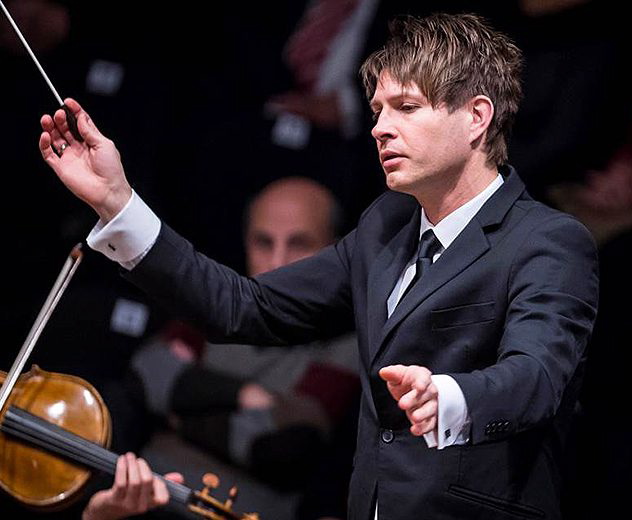Indianapolis Symphony fills Kennedy Center with apocalyptic sound

Krzysztof Urbański conducted the Indianapolis Symphony Orchestra Friday night at the Kennedy Center.
If the Albany Symphony’s appearance at the SHIFT Festival on Wednesday highlighted neoclassical composers, the Indianapolis Symphony Orchestra instead focused on atonal composers. This orchestra with a rising profile and musical chops to match took the Kennedy Center Concert Hall stage by storm on Friday, in a concert co-presented by Washington Performing Arts.
The dynamic young conductor Krzysztof Urbański, who took over the orchestra in 2010 when he was just 28 years old, chose to feature composers from his native Poland. He opened the evening with what he described as an encore before the fact, Orawa by Wojciech Kilar, known primarily for his film scores. Local listeners will remember this opening gesture from Urbański’s most recent appearance with the National Symphony Orchestra in 2016.
The piece opens with a handful of violins, slowly adding new string players. Urbański mostly marked sections and shaped phrases rather than beating time. Ensemble unity occasionally suffered as a result, but the evocation of Kilar’s homeland, the Carpathian region on the Polish-Slovak border, rushed and shimmered like a river of sound.
That moussey hors-d’oeuvre prepared the palate for the more substantial Cello Concerto of Witold Lutosławski. Remembered in Washington from classic performances by Mstislav Rostropovich during his tenure with the NSO, it is a long argument between the cellist and the orchestra. Much of the music is unmetered, unfolding in different tempi and brilliantly coordinated by Urbański, section by section.
Alisa Weilerstein’s solo playing could have used more fierce, searing tone, but her refined playing created an oasis of calm. The braying trumpets that barged into her opening monologue took on a different oppressive air. As the other parts of the large orchestra got involved, Weilerstein endured the cacophony with poised musicianship.
The whole orchestra growled in disapproval during the gorgeous “Cantilena,” a rising tide of discontent kept in check by Urbański. In a grudging moment of respect at the piece’s climax, the whole orchestra joins the soloist in a tense unison. With that fragile peace ultimately undone by the jawing trumpets again, the Finale concluded the work in a blaze of discord.
Although Krzysztof Penderecki had enjoyed success in an atonal style, he has turned away from it in his late period. “I very quickly had the feeling that that musical language was obsolete,” he once said in an interview. “It had had its time and could never be repeated. The musical material itself was tired.”
Penderecki’s Credo, composed in 1998 for the Oregon Bach Festival,is reflective of the “fullness of sound” he says he admires in Bruckner and Sibelius.
Urbański presided over a thundering performance of the work, having brought along a mass of singers from the Indianapolis Symphonic Choir and Indianapolis Children’s Choir, arrayed on risers behind the orchestra. With brass players expertly coordinated from the highest balconies on both sides of the hall, the surround-sound effect was brain-rattling.
This approach suited the piece, in the operatic style of Verdi’s Requiem, with mini-scenes of the Crucifixion, the Resurrection, the Second Coming, and bodily resurrection of all souls that illuminate corresponding sections of the Credo text. Added texts in Latin and Polish all came across with clear diction, including the delicate chanted sections for the children. Urbański’s crisp conducting kept the challenging staccato section of “Et resurrexit tertia die” squarely on the rails.
The quintet of vocal soloists was fitfully engulfed in the rising tide of sound around them, as Urbański pulled out all the stops. Mezzo-soprano Renée Tatum was the most imposing, her chest voice full but also warm in the “Et incarnatus est” and “Crucifixus” sections. Soprano Erin Wall and mezzo-soprano Alyssa Martin joined her in beautiful treble trio sections, with Wall pulling out blazing high notes at crucial points.
The celestial conclusion of the piece can only be comprehended in a live performance. As the choir anticipates “the life of the world to come,” chromatic lines soar higher and higher to an ecstatic, heaven-gazing final chord. Brass players far above the floor extended the chord seraphically, a prismatic echo promising paradise.
The National Symphony Orchestra will be the final orchestra featured in the SHIFT Festival this year, in a concert devoted to the memory of the late Russian baritone Dmitri Hvorostovsky 8 p.m. Saturday. kennedy-center.org; 202-467-4600.


